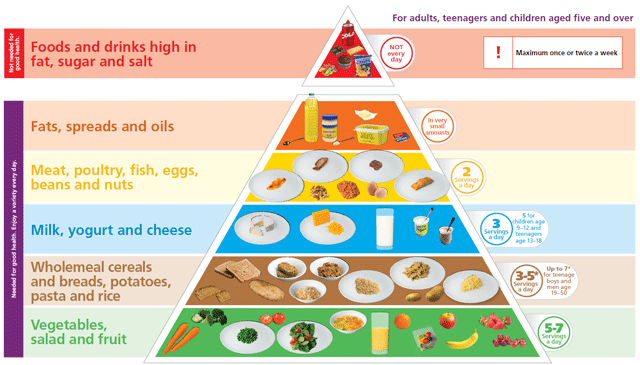What people eat is known to be one of the key factors influencing long term health of school children and staff. The school day provides the opportunity for having at least one of the daily meals within the school. The curriculum provides an opportunity to learn about food and healthy lifestyles. Through these guidelines Springdale National School aims to help all those involved in our school community, e.g. children, staff and parents, in developing positive and responsible attitudes to eating and to appreciate the contribution that good food makes to health.
1. Parents should ensure that children have a balanced breakfast to help them learn and concentrate better in school.
2. A healthy lunchbox includes a helping of food from the bottom four shelves of the food pyramid.
3. Some of the healthy foods that we encourage include fresh fruit, vegetables, cheese, standard yoghurts (non dessert), sandwiches, pasta, plain rice cakes and crackers.
4. All pupils are given the opportunity to avail of the EU School Milk Scheme (plain milk only will be offered and all milk cartons will be stored in the refrigerator). Milk is an excellent source of calcium which is the main mineral present in bones and teeth. For children aged 9-18 years, 5 servings of calcium rich foods are recommended due to the importance of this mineral during this life stage.
5. Water is made available throughout the day/ Pupils are encouraged to bring a bottle of water to school. If children do not drink enough water, they may become dehydrated, thirsty, tired and weak.
6. Chocolate spreads, chocolate/cheese dips, crisps, cereal bars and juice drinks are discouraged. Chewy /sticky bars, sweets, chewing gum, nuts and fizzy drinks are not permitted. In keeping with the Green Schools Initiative, which addresses reducing litter and hence protecting the school environment, foods which have wrappers are to be kept to a minimum and disposed of properly.
7. When refreshments are provided at school-related events, the school ensures that healthy choices are on offer.
8. Sweet treats for birthdays such as cakes, buns, sweets, party bags etc should not be brought into school as, in the school setting, there may be so many birthdays that sweet treats are available nearly every day.
9. Nutrition & healthy eating is included as part of the school curriculum.
10. Teachers and staff provide positive modelling and support attitudes to encourage healthy eating including providing non-food related rewards.
11. Healthy Eating initiatives are introduced regularly as an incentive to encourage healthy eating at school and at home.
12. This ‘Healthy Eating Policy’ will be reviewed every two years and the policy will be visibly displayed in the school.

